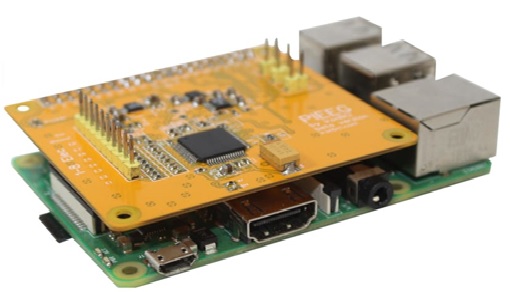Raspberry Pi-based Brain-Computer Interface
Brain-computer interfaces sound sci-fi but are in fact a reality. There are many different methods used to detect and interpret electrical activity in the human brain so that it can be used to control a computer. Usually, this is the domain of university research departments and places like Google Labs, but a paper on the arXiv open access server, by Ildar Rakhmatulin and Sebastian Volkl, proposes doing away with hyper-expensive equipment and using a Raspberry Pi instead. [1]

Figure 1. Raspberry Pi-based Brain-Computer Interface
Figure 1 shows maker Ildar Rakhmatulin is working to make entry-level brain-computer interfaces affordable and easy to build, designing an open source add-on for the Raspberry Pi family of single-board computers to interface with electroencephalograph sensors: the PIEEG.
"This project is the result of several years of work on the development of BCI [Brain-Computer Interfaces]," Rakhmatulin explains. "We believe that the easiest way to get started with bio-signals is to use a shield." [2]
Now, adding to the development of BCIs is a new concept proposed by two researchers, Ildar Rakhmatulin and Sebastian Volkl.
Being involved in the study and improvement of neural networks and machine vision for quite some time, they aim to get rid of highly expensive hardware for brain mapping functions and have thus devised a BCI system that uses Raspberry Pi.
With the help of PiEEG, a custom add-on board that was mounted over a Raspberry Pi 3, and which used C, C ++ and Python, was able to read up to eight electroencephalography (EEG) signals in real-time, collected in the brain by electrodes placed in a cap. The control of exoskeletons is also one of the proposed uses.
Besides Raspberry Pi 3, the PiEEG is also compatible with a Raspberry Pi 4 and can be connected through the GPIO pins. There are strict requirements that must be met for this to work, including isolation from noise generated by the AC power supply
The PiEEG intends to be launched soon via a Crowd Supply Campaign on the hackerBCI platform that was started for providing easy access to neuroscience projects and experiments. [3]
References:
- https://www.tomshardware.com/news/raspberry-pi-on-the-brain
- https://www.hackster.io/news/ildar-rakhmatulin-s-pieeg-aims-to-turn-your-raspberry-pi-into-a-brain-computer-interface-f4ed1c09a21c
- https://www.electronicsforu.com/news/whats-new/raspberry-pi-based-brain-computer-interface
Cite this article:
Thanusri swetha J (2022), Raspberry Pi-based Brain-Computer Interface, pp. 90

